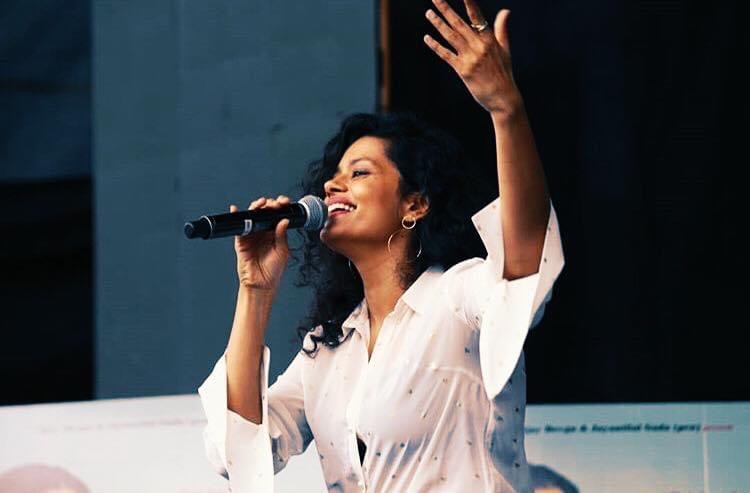The band included musicians Adil Manuel, Palomi Ghosh, Kanishk Diwaker, Aditya Ahir and Bihu Mukherjee

Vocalist Palomi Ghosh. Photo: Courtesy of the artist
One was confused with the title of the show. At first glance it sounded as a toss-up between a take-off on the jazz standard “Route 66” and on the jazz clubs of Churchgate, Bombay of 1966.
It actually was the latter and it was a concert laced with nostalgia of a bygone era. Adding to the intrigue was the presence on stage of the narrator, Naresh Fernandes, who read relevant excerpts from his book Taj Mahal Foxtrot, which is an authoritative discourse on the jazz era of Bombay from as early as the 1920s. Theme-based jazz concerts tell stories and are enjoyable because of the context.
In the case of Churchgate Swing 66, a band comprising Adil Manuel on guitar (also leader and arranger), vocalist Palomi Ghosh, Kanishk Diwaker on keyboards, Aditya Ahir on electric bass and Bihu Mukherjee on drums, played the entire set with no intermission. Fernandes read out his few paragraphs, accentuating the history of the era but was never intruding on the musical performance. Continuous images of jazz musicians both local and international were screened throughout the evening. One saw old photographs of Duke Ellington, Louis Armstrong, Dave Brubeck, Paul Desmond, Larry Adler and a galaxy of enormously talented and vibrant local musicians; it only added to the enjoyment of the concert.
Ghosh took us through an array of jazz songs, some of which might indeed have been played in the Bombay of 1966. “Just you, just me”, “Let’s face the music and dance”, “Wave” and “Corcovado” were common jazz currency from the 1960s.
Fernandes spoke of how the iconic Lorna from Goa would complete a jazz set and then go to a studio in Bombay to record songs in Konkani. Palomi sang three selections from Lorna’s Konkani contribution. Although backed by a jazz band, these lacked the swing associated with lively jazz renditions; perhaps it is because of the texture of the Konkani language.
On the other hand, the very popular Hindi film song, “Babuji dheere chalna” was beautifully rendered by the band with Ghosh driving the rhythm. Fernandes explained how the presence of Bombay jazz musicians in Hindi film orchestras brought with it the influence of jazz into Hindi films. This particular song (Babuji) is actually strongly based on the Cuban song, “Quizas, quizas, quizas” – very popular in the 1950s and rendered by the likes of Xavier Cugat and Perez Prado. Interestingly, a part of this song has also been used by Abba in their song, “Fernando”.
Ghosh also entertained us with “Too darn hot”, “Dream a little dream of me” and a pensive, introspective version of “Guess who I saw today”. It was a different sort of jazz concert. There was information, entertainment and a bit of Bombay jazz history thrown in.
However, there was one glaring deviation from accuracy. The use of keyboards and the electric bass guitar was unheard of in the Churchgate of 1966. The upright bass and acoustic piano was a lot classier. Looked and even sounded better!
But let that not detract from a thoroughly enjoyable jazz concert.
The second edition of the two-day festival brought rare collaborative performances such as Shye Ben…
"Kryptonite" singer previously revealed battle with stage four kidney cancer
From singing bhajans growing up to packing the stage at Lollapalooza India 2026 in Mumbai,…
‘Twinkling Watermelon’ isn't just another time-travel drama, but a deeply human story about recognizing the…
Founding member and guitarist Abdalla Ag Alhousseyni will perform with the band on their three-city…
The upcoming edition of the three-day festival takes place from Mar. 13 to 15, 2026…